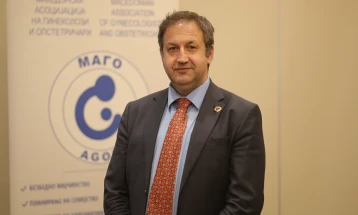China Focus’ Feature: Tangible Results in China's Eco-Environmental Protection

John Baker, WildAid Chief Program Officer, contributes a feature story to China Focus.
I have been working in the wildlife conservation and environmental protection field for nearly 40 years. From 2013 to before the outbreak of the COVID-19 pandemic, I visited China for one or two months every year, working with my Chinese colleagues, and visiting and learning from NGO peers, researchers, government agencies, and media partners. During this time I also personally experienced and witnessed the process of China’s sustainable development and a society that became more conscious about conservation.
I still remember a smoggy day in Beijing a long time ago, similar to the surge of PM2.5 in the air from the wildfires in California. Due to its rapid economic growth, the quality of China’s air, water, and soil has faced severe challenges. How to improve the quality of these elements and restore ecosystems, were pressing and urgent priorities for policymakers and society as a whole.
I feel that the past 10 years should be a decade of China’s awakening to environmental protection.
It is gratifying that since 2012, I have seen that the concept of ecological civilization and ambitious efforts to tackle air pollution, energy transformation, and biodiversity protection have helped reverse environmental degradation in just a few years, and that targets for reducing PM2.5 pollution in the 13th Five-Year Plan period had been met and exceeded.
Under such changes, through continuous public advocacy and education, I am delighted to see that Chinese society is demonstrating a firm embrace of sustainable development and environmental conservation. People are now striving to live by the principle “lucid waters and lush mountains are invaluable assets.” The organization I work for, WildAid, also advocates for the public to consciously protect wild animals and their habitats as a green environment through various publicity activities. The concept of sustainable life helps to build a beautiful China. It is gratifying that our long-term joint efforts have also yielded positive results. For example, the implementation of the domestic policy of prohibiting the commercial trade and processing of ivory, and the promotion of pangolins and sea turtles to first-class protected species, inspires us to do more.
We are also especially pleased to see that China is establishing the world’s largest national park system. It is beneficial to the protection of 30 percent of land and ocean all around the world, a milestone and an ambitious goal from the biodiversity of COP15. WildAid remains proud to support this system. We are actively collaborating with Northeast China Tiger and Leopard National Park and working with Chinese actor, director Wu Jing, in raising awareness of tiger protection and to mainstream the concept of a national park for biodiversity conservation.
The “Biodiversity Conservation in China” white paper released before COP15 listed “encouraging public engagement,” tied with “strengthening law enforcement and supervision and improving relevant policies, laws and regulations” as ways to improve
biodiversity governance, which shows that China has fully realized the importance of public awareness and behavioral change efforts in protecting wildlife. The United Nations “2030 Agenda for Sustainable Development” mentions the following: “We may be the last generation to have a chance of saving the planet. Therefore, everyone in the post-2020 world needs to act to ‘set nature on the road to recovery by 2030.’” Just as Zhao Yingmin, the vice minister of the Ministry of Ecology and Environment, said, “Contributions, regardless of size, are all strengths.”
Take Pangolin protection as an example of the importance of public engagement and law enforcement. As the most trafficked mammal globally, it was not a well-known species when WildAid and other conservation groups started the campaign. But over the years of collective efforts from government and civil society, including upgrading the protection level, enhancing law enforcement, and increasing public awareness, the pangolin has become a flagship species and has received greater protection. I think this is a perfect example of how important and effective public education and law enforcement are in biodiversity conservation.
Even more valuable is the “sustainable development” mindset of Chinese society today. From my observation over the years, I also think this kind of harmony that is valued in traditional Chinese culture, the harmony between humans and nature, actually adds a very important point of view to the discussion and practice of global environmental protection. I look forward to the day when the wisdom and experience of China’s biodiversity protection and sustainable development are applied internationally.
WildAid’s work is mainly based on the model of “conservation through communication,” inspiring the public to adopt a sustainable and eco-friendly lifestyle to achieve biodiversity conservation and climate change mitigation and adaptation worldwide. In recent years, we have also participated in more local protection projects in China, such as providing capacity building support for Qinghai Qilianshan National Park and its snow leopard, Lynx, Pallas’s Cat, Chinese Mountain Cat as well as many other endangered wildlife, by donating motorcycles for their conservation work which includes anti-poaching, fire-fighting, and epidemic prevention.
Having worked on endangered wildlife conservation and climate change issues in China since 2005, we have seen the progress of China as an international leader in wildlife conservation and climate action. In future, we will also cooperate with relevant government departments to further strengthen protection, ensure the safety of rare and endangered species and habitats, support strict law enforcement and supervision, and crack down on illegal and criminal acts.
We will strive to promote more inter-agency cooperation and international cooperation as a window to better showcase China’s ecological protection work and achievements.
Contact: Bai Shi
Tel: 008610-68996995
Email: baishi@cnfocus.com
_____________________________________________
MИА - ОТС Комерцијални соопштенија
Напомена: Оригинален текст. За содржината е одговорен нарачателот.











